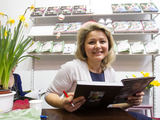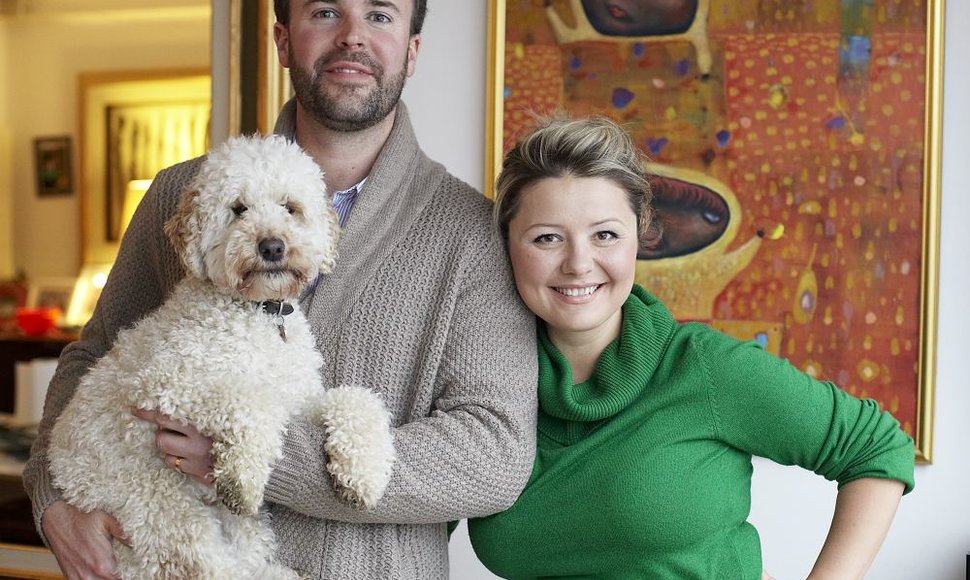The Migration Department has noted in recent years that more and more people, who have been studying or working abroad, once again declare Lithuania as their place of residence. And they are not just unskilled workers who toiled in farms, at assembly belts, or cafés and hotels. Among repatriating Lithuanians are also professionals with experience in financial centres like the City of London and celebrities have not been forgotten by their compatriots.
Canary Islands – far from heaven
 |
| Martyno Siruso/adfoto.lt nuotr./Algis Frankonis |
Algis Frankonis, who was once a relatively well-known Lithuanian singer, has returned home from the Canary Islands in order to resume the career he believes is meant for him – on the stage. “I have a degree from the Music Academy, while there (in the Canary Islands) I was working as a hotel administrator and doing other things that did not interest me in the least. At first, I was at a stage in my life where I needed to provide for my family. I probably could not have done it in Lithuania, even though we had good offers, even tours in Moscow. So we went abroad for only a year, but then we started doing business and stayed. Routine set in, years went by – until one day I thought: What am I doing here? I am a musician, I need to perform, not do business.”
Over the twenty years he spent abroad, he did not completely lose touch with either the stage – occasionally getting hold of a microphone in Spain – or Lithuania. The Frankoniai family would make several visits home a year, spend every summer in Lithuania. “I am only working there, I live in Lithuania,” the singer used to tell everyone.
Frankonis is a little annoyed when someone wonders why on Earth would he exchange sunny Spain for cool and rainy Lithuania: “Lithuanians have an odd idea that the Canary Islands are heaven. I do not feel at ease there – these are not my people, my culture, everything feels foreign. You are not a citizen, even though people do smile at you, are very friendly and open – whereas here one sees grumpy sad faces. Life in Lithuania is not easy, but some have a very tough time in Spain, too.”
The singer claims he has returned to Lithuania not to retire, but to perform. He already has a number of projects in his mind and plans at least three albums. He has put together a programme of ballads with fellow singers Judita Leitaitė and Liudas Mikalauskas. He is also planning to perform with his brother Valdemaras.
His wife Liuda remains in the Canary Islands for a time being – she likes it there. Meanwhile his daughter Loreta has been living in Los Angeles for years now. Frankonis himself spoke to 15min right before going to the US to visit his daughter for Easter.
British husband to become emigrant
 |
| Beata Nicholson |
TV host and author of several cook books Beata Nicholson will have her husband Tom step into the emigrant's shoes. She had the idea of coming back to Lithuania from the UK last summer, when the family was having a discussion about what they were expecting from the future.
“We have decided that we want to spend more time with kids (me and Tom), work less (Tom), eat more of my dad's tomatoes and other home-grown vegetables (me), be closer to nature and fly less frequently (me), spend more time with my family (me), exercise more (Tom), grow chickens (me), spend more holidays not in Lithuania (Tom), improve Lithuanian (Jurgis and Tom),” Beata wrote in her blog.
She tells 15min that she has always wished to come back home, so, after moving to London, she worked on keeping her connections with people who stayed here, held back on making a career in England and instead freelanced on Lithuanian TV channels – did what she preferred to do rather than what seemed more promising. Beata says she puts her children above her career – as well as daily face-to-face (rather than virtual) communication with her sister and mother (her father has passed away).
“We are not giving up anything by moving here. In London, we had a life, friends, but meeting with them was tricky. It is easier to fly to London from Lithuania,” Beata assures. “It is a syndrome of the big city – everything is happening more slowly, you have to plan your life two weeks ahead. Even before, we'd come to Lithuania often: kids, three or four times a year; Tom, twice; me, every month.”
When the Nicholson family moves to Lithuania, the two spouses will have swapped places – the husband will have to make frequent trips to London to oversee business, yet will spend more time looking after the family's two kids who will go to a school in Vilnius.
Meanwhile Beata will continue hosting TV shows, writing her blog. She is working on her fourth cook book. She is most happy that she will be able to, once again, eat fresh beetroots, cucumbers, and tomatoes straight from the garden, grow potatoes, go to the forest regularly to pick bilberies and mushrooms, throw dinner parties for her friends, and drive to a lake or sea whenever she feels like it.
“I've received incredible support – moving to a different country with kids is no easy task. But one shouldn't give too much prominence to it – people move from one town to another all the time. It's better to try things out and realize that it's not your cup of tea rather than spend a lifetime wondering, what if...” Beata thinks. She compares her life to a disco: “You can stand by the wall and wait until someone invites you to dance – or you can go on the dance floor and try out all your moves without anyone prompting you.”
Modest lifestyle
Another former Londoner, Mykolas Majauskas, returned to Lithuania in 2008, to be an economy and finance adviser to the then prime minister Andrius Kubilius. Majauskas is no longer an adviser but nor is he eager to return to London.
 |
| Mykolas Majauskas |
Before his departure, the young finance professional had been working for Barclays Capital in the City of London and saw the onslaught of the financial crisis from up close. It was a period when change was welcome, since international financial markets were swept with pessimistic moods and new exciting projects were scarce.
With a letter of reference from Lithuania's ambassador to the UK Vygaudas Ušackas, he met with Kubilius, who was forming his cabinet, in late 2008. Mykolas was easy to convince to come to Vilnius.
He left Lithuania when he was 19, having spent one year studying economics at Vilnius University. He went to Australia and after waiting on tables for a few years, he entered Sydney University. Upon graduation, he landed a job in a British real estate company, from whence, four years later, he switched to Barclays Capital. He later assisted in getting the company enter the Lithuanian market.
“Over the many years abroad, I had lost touch with issues that were urgent in Lithuania and I felt I owed it for the opportunity to go and develop my skills abroad,” Majauskas tells 15min. “Enthusiasm for challenge and cooperation trumped fears and reservations. Upon learning about my unorthodox decision to leave London for Lithuania, my colleagues at the bank showered me with encouraging remarks and polite promises to take me back. I consulted with my father and came back, with my entire family.”
Besides, with the crisis looming, he could not be sure about keeping his job in the City: “Had I stayed in my position at the bank, it is likely that I would have been let go within several years.” Still, he would have found another job easily enough – and such certainty “can be depressing, one wants to shake up life a bit.”
He says he feels no regrets about the decision – the years with the government, albeit demanding in terms of adapting to a new environment and different lifestyle, were interesting enough.
“Such a gap between my income in Vilnius and what I was used to in London lifted my sense of humour to a new level,” Majauskas laughs. “We have learnt to live modestly. Without much hesitation, I implemented the good practice of public finance management at home – as income dropped, I entrusted all household budget management to a woman's hands.”
New opportunities
On the other hand, Majauskas adds, life in Lithuania can be more comfortable in many ways – with some effort, one can build a Scandinavian lifestyle here.
Financial risks, however, are greater. You can have a well-paid job one day and lose it the next without any chance of landing something similar; you put a deposit in a bank and, within a year, the bank is gone; you attract investment to your business venture but them the law is changed and you have to close down within a month. Corruption, the black market, poor work culture are rules rather than exceptions, but on the other hand, Lithuania is one of the fastest-growing economies in Europe, receptive to new technologies, has a well-educated population.
After his conservative employers lost the election, Majauskas decided to try out the Lithuanian labour market and wrote letters to heads of the four biggest banks in the country.
“While I was working for the government, we were all great pals, they'd call me, write letters, invite to parties, send Christmas cards. Now, one of them did not reply, another offered to meet sometime, the third one came back a few weeks later with a job offer, and the fourth responded that same day with an attractive proposal. It is not as bad as one might think,” he recalls.
Majauskas did not, however, accept the position. He took out a business certificate and began consulting on selling companies and attracting investment. At the moment, Majauskas is a board member of Pigu group, one of the biggest internet shops in Lithuania, and has no plans of returning to the sphere of public finances.
Youth convention
 |
| Kęstas Pikūnas |
Kęstas Pikūnas, president of the World Lithuanian Youth Association, knew he would be heading for the UK while still at school. After graduating from a school in Panevėžys, he taught English to kids and, one year later, flew to London with his brother to study management and marketing.
His parents helped with tuition at first, but later he had to make it on his own, working as a night guard after classes. He also found time for other activities – he was in charge of his university's sports programme, organized sporting competitions, coached women's football team, played basketball, raised money for charity, was the president of university business association, founded a campus café.
He later got involved with the World Lithuanian Youth Association and took up business – looking for clients for a Lithuanian printing house. After 12 years in London he decided to move to Vilnius and show, with his own example, that Lithuania welcomes her expatriate sons and daughters.
“Thoughts of going back would come often, perhaps because my original plan was to return home right after graduating. One simple reason made me finally make the decision – I was organising the World Lithuanian Youth Convention that took place last summer,” Pikūnas recalls.
He has no reason to regret his choice: “I am surrounded by loving friends, family, and culture I grew up in. Do I miss life in London? Yes. But likewise, I'd miss Lithuania and small things I couldn't get there. Life is made up of details that we sometimes fail to appreciate. I am happy with what I have here and now.”
Returning in numbers
Lithuanian repatriation has intensified in recent years. In 2012, the number of emigrants dropped by 12.8 thousand, while the number of repatriates grew by 3.3 thousand.
17.3 thousand Lithuanian citizens came back to the country last year – some 25 percent more than the year before and about three times more than in 2010. Every other repatriate came from the UK, every eighth from Ireland, every twelfth from Norway. Similar trends were observed in 2011. Most of the returnees were young people.
True, emigrants still outnumbered repatriates more than 2 to one. According to Statistics Lithuania, 41.1 thousand people left the country last year (1.3 times fewer than the year before). That translates to 13.7 emigrants per population of one thousand.
Almost 80 percent of those who left declared their new place of residence within the European Union – most of them went to the UK (48 percent) and Ireland (9 percent). Many Lithuanians also went to Germany, Norway (8 percent), the US (4 percent), Spain (3 percent), Sweden, Russia, and Denmark (2 percent each).













